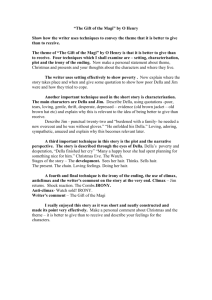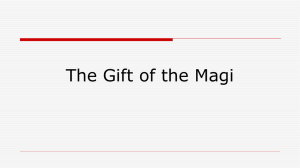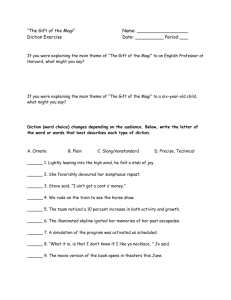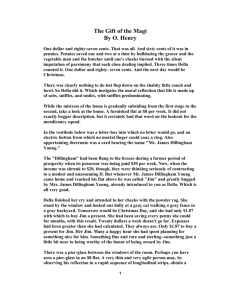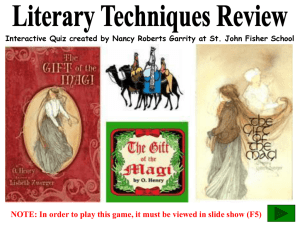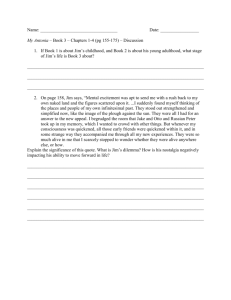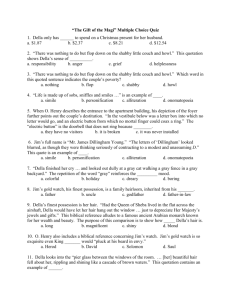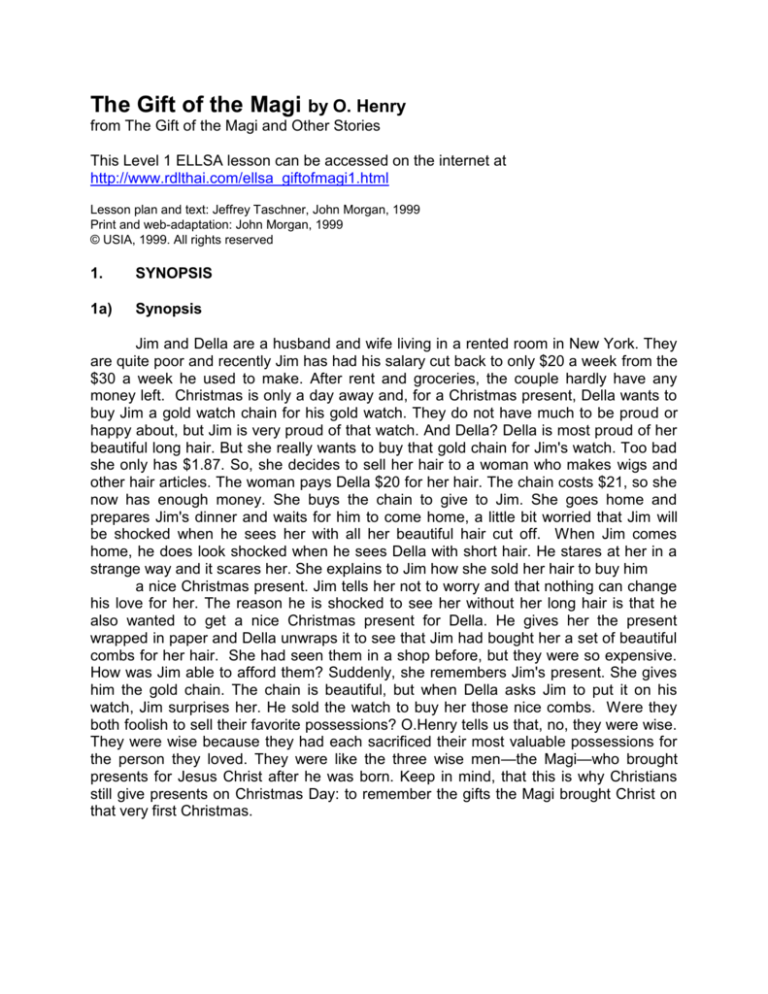
The Gift of the Magi by O. Henry
from The Gift of the Magi and Other Stories
This Level 1 ELLSA lesson can be accessed on the internet at
http://www.rdlthai.com/ellsa_giftofmagi1.html
Lesson plan and text: Jeffrey Taschner, John Morgan, 1999
Print and web-adaptation: John Morgan, 1999
© USIA, 1999. All rights reserved
1.
SYNOPSIS
1a)
Synopsis
Jim and Della are a husband and wife living in a rented room in New York. They
are quite poor and recently Jim has had his salary cut back to only $20 a week from the
$30 a week he used to make. After rent and groceries, the couple hardly have any
money left. Christmas is only a day away and, for a Christmas present, Della wants to
buy Jim a gold watch chain for his gold watch. They do not have much to be proud or
happy about, but Jim is very proud of that watch. And Della? Della is most proud of her
beautiful long hair. But she really wants to buy that gold chain for Jim's watch. Too bad
she only has $1.87. So, she decides to sell her hair to a woman who makes wigs and
other hair articles. The woman pays Della $20 for her hair. The chain costs $21, so she
now has enough money. She buys the chain to give to Jim. She goes home and
prepares Jim's dinner and waits for him to come home, a little bit worried that Jim will
be shocked when he sees her with all her beautiful hair cut off. When Jim comes
home, he does look shocked when he sees Della with short hair. He stares at her in a
strange way and it scares her. She explains to Jim how she sold her hair to buy him
a nice Christmas present. Jim tells her not to worry and that nothing can change
his love for her. The reason he is shocked to see her without her long hair is that he
also wanted to get a nice Christmas present for Della. He gives her the present
wrapped in paper and Della unwraps it to see that Jim had bought her a set of beautiful
combs for her hair. She had seen them in a shop before, but they were so expensive.
How was Jim able to afford them? Suddenly, she remembers Jim's present. She gives
him the gold chain. The chain is beautiful, but when Della asks Jim to put it on his
watch, Jim surprises her. He sold the watch to buy her those nice combs. Were they
both foolish to sell their favorite possessions? O.Henry tells us that, no, they were wise.
They were wise because they had each sacrificed their most valuable possessions for
the person they loved. They were like the three wise men—the Magi—who brought
presents for Jesus Christ after he was born. Keep in mind, that this is why Christians
still give presents on Christmas Day: to remember the gifts the Magi brought Christ on
that very first Christmas.
1b)
Vocab Checkpoint
• cut back (phrasal verb) To cut back is to reduce salary or spending which is usually
done in times of recession or slow business. It can be used as a phrasal verb or as a
noun.
• groceries (noun) Groceries, as a countable noun, are food provisions. We usually
consider these as essential food items (milk, eggs, rice, vegetables, etc). As a noncountable noun, grocery is used to describe the store where groceries are purchased.
• watch chain (noun) A watch chain is a chain that attached to an old-fashioned
pocket-watch. The other end of the chain was attached to a waistcoat button hole so
that the watch would not be lost if it fell out of the pocket.
• Too bad (adjective) (colloquial) Too bad is an expression which is similar to it's a
shame, or it's a pity. It expresses a feeling of disappointment at not being able to do
something.
• wigs (noun) A wig is a false hair covering for the head. Wig makers pay for real hair
by its length. A person like Della, with extremely long hair, would be able to get a good
price for cutting it short. Other words such as hairpiece and toupee (pronounced too
pay) are also commonly used to describe smaller coverings that are not full wigs.
• shocked (adjective) To be shocked is to be very surprised. It is also a noun (shock)
and a verb (to shock).
• strange (adjective) Strange means unusual. In this case it refers to the way Jim looks
at Della in an unexpected manner.
• possessions (noun) Possessions are personal belongings. The things that we own. It
is related to the verb possess which means to hold, to keep or to own.
• sacrificed (verb) Here sacrificed is used as a verb. To sacrifice something is to give
away something valuable in order to help somebody else. It can also be used as a
noun, together with the verb "to make", e.g. He made a big sacrifice to help his family.
• valuable (adjective) When something is valuable it is either worth a lot of money, or it
has strong emotional value and is something that can not easily be replaced.
2.
PRE-STORY
2a)
Gifts
•
•
Do you celebrate Christmas in your country?
What are some of the ways that your country observes Christmas?
•
•
What are some other times of the year when people in your country like
to give or exchange gifts?
What is the best gift you've every received?
Think about it and then tell a friend. Work with a friend or think about someone
you know well. Now think of a gift you think that person would like to receive for
Christmas, New Year or a birthday (or another special occasion).
Write the gift down on a piece of paper, but don't show it to your friend. Don't tell
them what it is. Make them guess what it is. How well do you know each other?
2b)
Important dates
Christmas is a very special occasion for millions of people around the world.
However, many people think that Christmas has become too commercial and it
is easy to forget the true spiritual meaning of a special occasion.
Think about all the special events in your country or region. Make a list of all the
special dates that you celebrate during each year. Pay careful attention to the
ones that you or your family celebrate most.
Write a short description of what you do on one of those special occasions.
Don't forget to include the names of the people who join in the celebration and
places you visit. Especially, write about the things you do on those days that
are connected to the real meaning of the celebration and why you do them.
Which is the most important day of the year for you?
3.
IN-STORY
3a)
The Magi were the three wise men who brought gifts to Jesus Christ when he
was born. Magi is the plural of magus: a magus is a wise man or magician. The
words magic and magician are derived from magus.
If you have worked with the first four lessons in ELLSA, look at the review the
elements used in The Gift of the Magi.
Setting
What is the setting of the story? Think about time and place.
Character
How many characters are in the story?
Can you name them?
Which character speaks the following lines and what do these lines tell us about
their character?
• And now I think we should have our dinner.
• Will you buy my hair?
• I sold the watch to get the money to buy the combs.
• You've cut off your hair?
• Isn't it perfect, Jim?
• What could I do with a dollar and eighty-seven cents?
• Don't you like me now?
• You won't care, will you?
Re-tell the story by putting the lines in order.
Check your answers in the answer key.
Plot
What is the climax of the story?
What is the resolution of the story?
Conflict
What are some of the possible conflicts that could arise in a story like this?
Think back to the anxieties of Jim and Della (the answers to the character
exercise could help you here).
Write a short dialog based on one of the possible conflicts that could arise.
You might like to develop this into a short dramatic performance for the rest of
the class.
3b)
Theme
This lesson introduces the final element of the short story that will be examined
in the first section of ELLSA: the theme of the story. Look up the word theme in
a dictionary or a thesaurus.
You will probably find most of the following synonyms for theme: topic, idea,
subject, issue, point.
The last word, point, is a good way to think about theme. The theme is the point,
or reason, for writing a story. Some people think of theme as the message or
meaning.
3c)
Major and Minor Themes
A story usually has one main theme and several minor themes. Below is a list of
some common general themes in literature around the world. Think of some
stories or movies that you are familiar with and try to identify some of the themes
in them. Eight of these themes can be found in The Gift of the Magi. Explain how
O.Henry uses each theme you identify and then check the key to see if you have
found all the themes in the story.
• Art
• Beauty
• Bravery
• Death
• Fear
• Family
• Faith
• Freedom
• The Future
• Giving
• Greed
• Growing Up
• Heroism
• Honesty
• Hope
• Identity
• Independence
r
r
r
r
r
r
r
r
r
r
r
r
r
r
r
r
r
• Justice
• Knowledge
• Law
• Loss
• Love
• Money
• Nature
• Peace
• Poverty
• Pride
• Sacrifice
• Religion
• Sacrifice
• Truth
• War
• Wisdom
r
r
r
r
r
r
r
r
r
r
r
r
r
r
r
r
Check your answers in the answer key
3d)
Ranking: Major and Minor Themes
Rank the eight themes identified above from 1-8 with 1 being the main theme in
the story and 8 the least important minor theme. There are many possibilities,
depending on your personal beliefs. Compare and contrast your choice for
main theme with other people.
4.
EXERCISES
4a)
Exploring specific themes: Sacrifice & Wisdom
Sacrifice
Many teachers in the USA feel that sacrifice, or giving up something for someone
else, is the main theme in The Gift of the Magi. Both Della and Jim make sacrifices so
they can buy Christmas gifts for each other. Who made the greatest sacrifice, Della, by
selling her hair or Jim, by selling his watch? Why? Write a short paragraph of your
own thoughts on this matter. You can use this paragraph to help you in classroom
discussion or debate.
Wisdom
At the end of the story, O.Henry seems to be saying two different things. Read
below from page 6 in The Gift of the Magi. And here I have told you the story of two
children who were not wise. Each sold the most valuable thing he owned in order to buy
a gift for the other. But let me speak a last word to the wise of these days: Of all who
give gifts, these two were the most wise.
• Who are the two children?
• Why does O' Henry refer to them as "children"?
• How were they unwise?
• How were they wise?
Compare with the notes on this exercise in the answer key
4b)
Themes & proverbs
Usually, an authors theme can be stated in terms that resemble familiar sayings
or proverbs.
Look at these English sayings. Are there similar sayings in your language. If not,
can you translate them easily into your language?
• Love is the greatest gift of all.
• Money can't buy you love.
• A gift must come from the heart.
• Beauty comes from within.
Which of the four sayings best describes the main theme of The Gift of the
Magi?
5.
FOLLOW-UP
Dramatization
Animators and movie makers use a technique called "story-boarding" to
illustrate the scenes as they want them to be represented on screen. A story
board is like a sketch of the characters and setting, with the intention of visually
interpreting, plot, conflict and theme. Even though it may be difficult to draw
illustrations that would interpret events from a story such as The Gift of the Magi,
it is possible to provide short written descriptions of each scene as it is
intended to be portrayed. This is a common technique in script writing.
• Plot a new ending for the story.
• Imagine that Della tries to buy back Jim's watch.
• How will she raise the money?
• What will Jim's reaction be?
Draw a few sketches that illustrate the scenes from the story or write
descriptions of the scenes as you would like them to be portrayed. In groups of
three, plan and perform a short skit using the dialog you have created and the
scenes you have visualized.
Think carefully of all the elements you have worked with in the five short stories:
character, setting, plot, conflict and theme. How does your new ending relate to
each of these elements?
ANSWER KEY
3a)
Which character speaks the following lines? Answers
Which character speaks the following lines, Jim or Della?
What does each line tell us about their character?
And now I think we should have our dinner.
Jim: he doesn't want either of them to worry or think too much about their new
gifts and lost possessions. He just wants them to enjoy Christmas together.
Will you buy my hair?
Della: she is willing to sacrifice her beautiful hair to be able to buy a nice gift for
her husband.
I sold the watch to get the money to buy the combs.
Jim: he is willing to sell his most prized possession, his watch, to buy Della a
nice gift.
You've cut off your hair?
Jim: he realizes that Della will not need the combs he bought her for a while.
Isn't it perfect, Jim?
Della: she really wants to make Jim happy.
What could I do with a dollar and eighty-seven cents?
Della: she doesn't have very much money and she is worried that she can't
buy a nice present for Jim.
Don't you like me now?
Della: she is worried that Jim will not like her with short hair.
You won't care, will you?
Della: she is worried that Jim will not like her with short hair.
• In what order are the lines spoken in the story? (2, 6, 8, 7, 4, 5, 3, 1)
3c)
Major and Minor Themes: one interpretation of the story
The eight themes that O' Henry uses are:
4a)
Beauty
Della is worried that Jim won't think she is beautiful with
short hair, but Jim loves her for more than just her beautiful
hair and how she looks. If you really love somebody, they
are beautiful no matter how they look.
Family
Jim and Della are husband and wife and they love each
other. Jim's watch was given to him by his father and has
been in his family for many years. Still, he sacrifices it out of
love for Della.
Giving
Della and Jim both feel that it is important to give nice gifts
to each other to express their love.
Identity
Della learns that Jim loves her for just for being herself, not
because of her hair or the Christmas present she buys him.
Love
Because Jim and Della love each other, there is really no
need to prove their love by buying gifts for each other.
Love
is the greatest gift. Money Della and Jim sell valuable
things to get money to buy gifts for each other, because they
are poor.
Sacrifice
Both Della and Jim give up valuable possessions so they
can buy Christmas gifts for each other.
Wisdom
Della and Jim were wise because they were willing to make
sacrifices to show their love for each other.
Exploring specific themes: Sacrifice & Wisdom—notes
Wisdom
At the end of the story, O.Henry seems to be saying two different things. Read
below from page 6 in The Gift of the Magi.
“And here I have told you the story of two children who were not wise. Each sold
the most valuable thing he owned in order to buy a gift for the other. But let me
speak a last word to the wise of these days: Of all who give gifts, these two were
the most wise.”
Who are the two children?
Jim and Della
Why does O' Henry refer to them as "children"?
Although they are both young adults, they are simple like children in many
ways.
How were they unwise?
They sold valuable things to buy gifts that they didn't really need to buy in the
first place, because they were truly in love.
How were they wise?
They thought only of the other person and not of themselves when they gave
their gifts.

